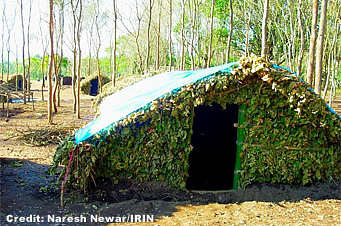|
UN
monitoring of arms and armies to begin
|
 |
KATHMANDU,
29 Dec 2006 (IRIN)
The
United Nations will launch its first arms monitoring operation in Nepal
beginning on 7 January to implement its support to the peace process as
requested by the Maoists and the interim government of seven national parties,
which signed a historic peace agreement in November ending the decade-long
armed conflict that had killed over 14,000 Nepalese people.
 |
| <<
UN monitors will be stationed in Maoist cantonment sites such as this one
in Surkhet district, 700 km west of the capital
The
first group of UN arms monitors, six of them, arrived in the capital, Kathmandu,
on Thursday from Canada, Guatemala, Indonesia, Jordan, Uruguay and Yemen,
where they will join four military advisors from Finland, Norway and Switzerland,
Ian Martin, personal representative of the UN Secretary-General, said.
Nine
more would also arrive over the next few days, while an additional 20 monitors
would soon arrive bringing the total of 35 as agreed by the UN Security
Council on 1 December. |
|
"A
first task will be registration, initially of weapons and then of combatants,"
said Martin, who added that they would be provided training and helicopters
so as to maximise their access to the Maoist army cantonments and the Nepal
Army barracks in the country.
Through
the Joint Monitoring Coordination Committee (JMCC) that consists of representatives
from the Maoists, Nepal Army and the UN, the UN monitors will be stationed
in the seven main Maoist army cantonment sites in both rural and urban
areas of the Himalayan nation.
According
to the committee, the UN's containers for the storage of Maoist weapons
have been already placed in four of the cantonments. These storage containers
will have a single lock provided by the UN, while a storage key will be
issued to the main cantonment site commander. A 24-hour surveillance camera
will cover the storage site and will be monitored from the UN office in
the cantonment site, explained the committee members.
Meanwhile,
the UN has agreed to the tripartite decision with the Maoists and government
to the recruitment of an Interim Task Force (ITF) composed of Nepalese
ex-servicemen from the Indian and British armies to enable a 24-hour presence
at weapons storage sites.
The
ITF - whose activities will be coordinated through the UN and the parties
- will be phased out as soon as the deployment of the UN monitors reached
the required strength, said Martin.
In
addition, the UN would be making frequent visits and would remain responsible
for the (army and arms) registration procedures, as well as for investigating
any alleged violations of the agreement on the modalities of arms and armies,
Martin noted.
top
Credit
IRIN 2006
Copyright
© UN Office for the Coordination of Humanitarian Affairs 2006
[
This report does not necessarily reflect the views of the United Nations]
Integrated
Regional Information Networks (IRIN), part of the UN Office for the Coordination
of Humanitarian Affairs (OCHA).

|

